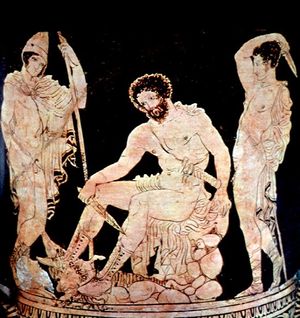The Odyssey Summary:Book 11
Taking up the ram and ewe left by Kirke, Odysseus and his men sail toward the region of the “Men of Winter”, or Hades. When Odysseus and his men arrive, Odysseus digs a pit in which to spill the blood of the ram and the ewe in sacrifice to the dead of Hades. He promises Teiresias and the other dead more prized sacrifices when he arrives at Ithaka. Once the blood of both the lamb and the ewe was shed into the pit, Odysseus must fend off the walking dead with his brazen sword.

The first shade, or ghost, that appears to Odysseus is one of his men, Elpenor. Elpenor was left unburied and miserable after he fell off of a roof looking for a ladder. After Odysseus promises to give him a proper burial, the blind prophet, Teiresias, appears and tastes of the blood in the pit and begins to speak to Odysseus.
He tells Odysseus the reason for his misfortune — he blinded Polyphemus, son of Poseidon. He warns Odysseus not to kill the herd of Helios, the result of this action being the loss of his crew and ship. Teiresias also foretells of the slaughter that Odysseus will bring to the suitors that are in his home.
Odysseus then speaks with his mother, Antikleia. She tells him that his father is in the wilderness, and his son is a man, and that he should not spend too much time in the underworld. He then held conversations with many shades, including: Alkmene (Hercules’ mother), Epikaste (Jocasta, Oedipus’ mother), Leda (mother of Clytemnestra), King Alkinoos, Agamemnon (he tells Odysseus how he died), and Ajax (who still holds a grudge against Odysseus for the battle over Achilles’ armor).
Odysseus also encounters the shade of Achilles, who asks Odysseus about the fortune of his son, Neoptolemos, or “new war." Odysseus berates him for looking down, and Achilles responds mordantly: what do you know of death, Odysseus? Achilles then tells Odysseus that he would rather be alive and enslaved than the greatest warrior among the dead.
Odysseus then moves around Hades to see the other dead in the area. He sees Orion, Tityos and his gnawed liver, Tantalos (the root for the word “tantalize”) and the teasing water and fruit, Sisyphus pushing the boulder up the hill, and finally Heracles (Hercules). He then sees Persephone carrying “some saurian death’s head” and he decides that it is in his and his men’s best interest to leave on the ocean.